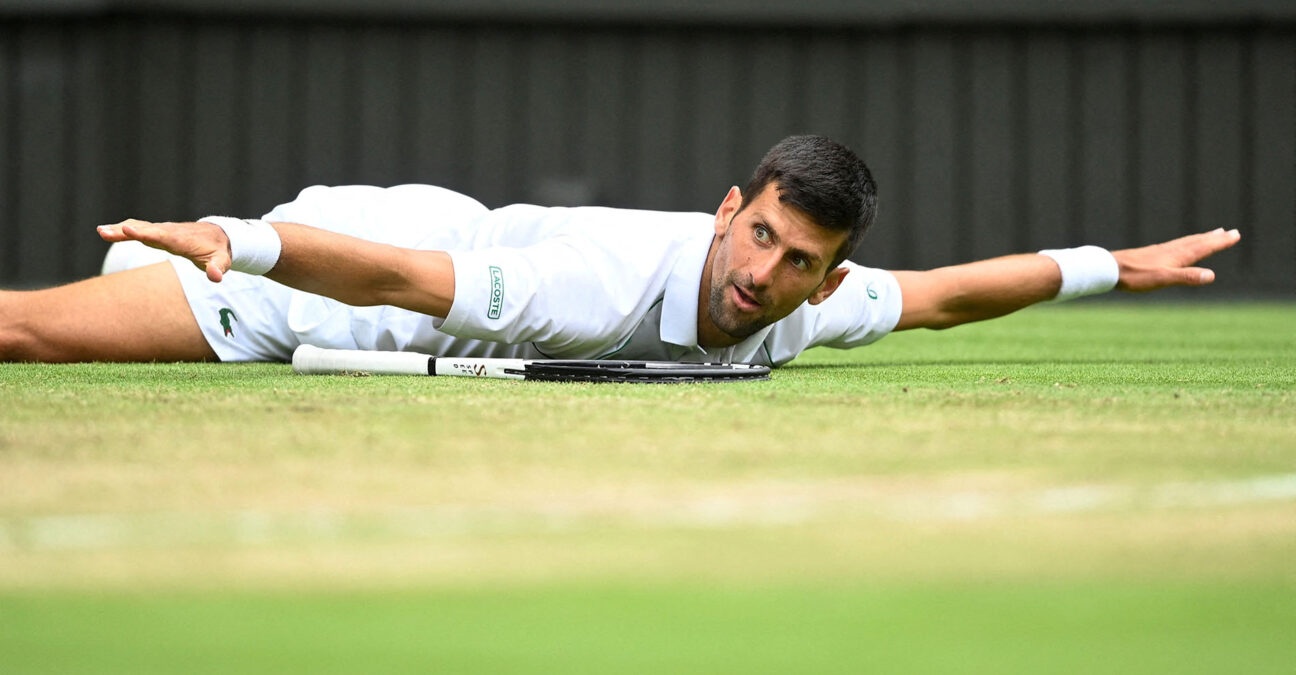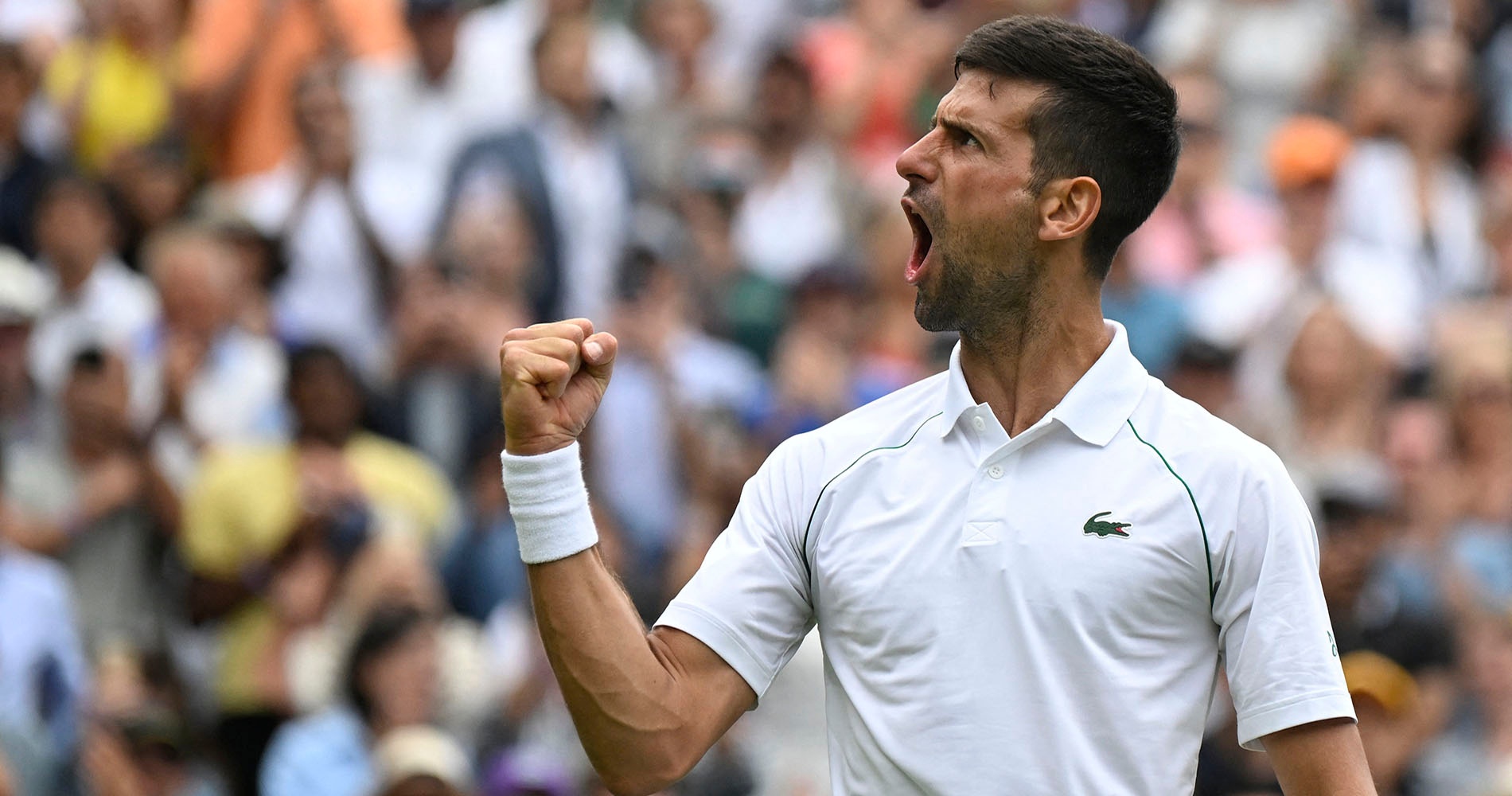Five sets and one single-minded miracle man – Djokovic has a knack for rising from the ashes
Novak Djokovic used every tool he had at his disposal to rally from the brink of defeat on Tuesday at Wimbledon. It’s a trick the Serb has become quite good at…
 Serbia’s Novak Djokovic reacts during his quarter final match against Italy’s Jannik Sinner || AI / Reuters / Panoramic
Serbia’s Novak Djokovic reacts during his quarter final match against Italy’s Jannik Sinner || AI / Reuters / Panoramic
Since 2011, Novak Djokovic has fallen behind two sets to love 16 times at the Grand Slams. Not a lot, to be sure. Even more remarkable, however, is the fact that the world-beating Serb has won six of those sixteen matches, starting with his match point miracle against Roger Federer in the US Open semi-finals in 2011.
More recently, Djokovic has won three of the last four matches in which he has fallen behind by two sets to love. Last year, at Roland-Garros, he did it twice en route to his 19th major title.
Tsitsipas – he came back like a different player
After the 2021 Roland-Garros final, Tsitsipas tried to make sense of the loss.
“I kept the things that were working for me,” Tsitsipas said. “I don’t know, he left the court after two sets to love down, I don’t know what happened there, but he came back to me like a different player suddenly.
“I kind of felt like he could read my game a bit better suddenly. Good for him. He did well to get there.”
Djokovic, the far more experienced player, enjoyed a psychological advantage for the rest of the match against Tsitsipas.
“I felt like I got into his head,” he would later say. “I feel like I started swinging through the ball better. The momentum was on my side, it shifted. There was no looking back from that moment.”

Sinner had nothing to lose… until the third set
Tuesday’s victim was 20-year-old Italian Jannik Sinner, who was contesting just his fifth five-set match at the majors. He didn’t feel that he did much wrong in the final three sets. Djokovic simply took it from him.
“I think I played well,” Sinner told reporters after the battle. “I knew that he’s gonna change something, so I tried to prepare myself before.”
After the victory Djokovic made an interesting statement to reporters when asked about playing and winning fifth sets at the majors. He noted that Sinner went from a freewheeling seizer of the moment to a deer in the headlights, simply because of the score, and the new reality it presented to the Italian.
“I feel like Sinner, you know, coming into the match didn’t have much to lose, but he had a lot to lose when he was two sets to love up. I could feel that mentally with him,” Djokovic said, displaying a prescience that undoubtedly helped him navigate the tricky terrain of his latest Grand Slam cliffhanger.
When we compare the relative experience of the two players in five-set matches we can see that Djokovic had a big advantage. In his career Djokovic has come back from two sets to love down (7) more times than Sinner has played five-set matches (5).
At 35, the Serb can draw upon his wealth of experience at critical junctures, while Sinner simultaneously is forced to fly by the seat of his pants.
It’s not a guarantee of success, but it helps.
“I guess the more times you win, coming back from two sets to love down, the better you feel every next time you face these kind of circumstances,” Djokovic said. “Of course it’s not a guarantee that you’re always going to win those particular matches, but at the same time, you’ll have a better chance because you have experience and you have a pretty good record.”
Also important: there is a big difference between having experience and having the wherewithal to utilise it in the fast, furious flow of a Centre Court encounter.
Djokovic has the former, but critically, the latter. That’s why he’s still alive in the draw, riding a 26-match Wimbledon winning streak at SW19.
A pep talk always helps
Rules do not allow a coach to talk with players during toilet breaks on tour, but Djokovic did the next best thing on Tuesday after the second set. He took a good, hard look in the mirror and injected some positivity into his mind.
The top seed didn’t have a lot of time, but he made the moment count.
“The toilet break really helped, a little pep talk in the mirror,” Djokovic told ESPN on Tuesday evening. “It didn’t feel so real at the time because I was really down on myself but then I just actually vocalized support and a kind of positivity, said a few sentences in the mirror – and it worked.”
“I didn’t have too much time, and now we have a time clock for the toilet breaks. So basically, it was quite short. I was washing my hands and I looked at myself in the mirror and said “Okay, now you can do it. Okay it’s a different match. Start off well, forget about what happened’ – those types of things.”



People in this post
More tennis news
“I would like to thank me”: 17-year-old Andreeva wins Dubai title

Qatar Open: Rublev wins 17th career title

“Shame” – Zverev regrets losing Rio quarter-final to Comesana from a “winning position”

Alexandre Muller defeats Cerundolo, reaches first ATP 500 semi-final

February 22, 2007: The day Wimbledon finally announced it would award equal prize money





